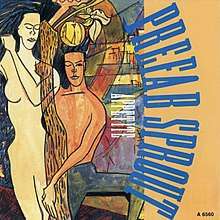Appetite (Prefab Sprout song)
"Appetite" is a song by English pop band Prefab Sprout from their album Steve McQueen. Released as the album's third single by Kitchenware Records in August 1985, it reached number 92 on the UK Singles Chart. Despite its disappointing chart performance, the song has been singled out as one of the highlights of Steve McQueen.
| "Appetite" | ||||
|---|---|---|---|---|
 | ||||
| Single by Prefab Sprout | ||||
| from the album Steve McQueen | ||||
| Released | August 1985 | |||
| Recorded | 1984-85 | |||
| Genre | ||||
| Length |
| |||
| Label | Kitchenware | |||
| Songwriter(s) | Paddy McAloon | |||
| Producer(s) | Thomas Dolby | |||
| Prefab Sprout singles chronology | ||||
| ||||
Composition
Paddy McAloon wrote "Appetite' in 1984. It was one of the first songs he'd composed on a keyboard[1] and was written using a "hip-hop-type groove" on a drum machine.[2] The song's lyric is about "a pregnant girl so in love with her child that she wants to name it after all the good things in her life".[3] The chorus makes reference to the legendary heroic outlaw Robin Hood, said to have to have robbed from the rich and given to the poor ("So if you take - then put back good / If you steal - be Robin Hood").[4]
Recording
Producer Thomas Dolby plays the synth intro of "Appetite". He contributed several synth textures to the song, including rolling arpeggiating synth in the choruses and soft pads mirroring Wendy Smith’s backing vocals.[5] Dolby worked closely with Martin McAloon on the song's bass part. He had McAloon sing cut-up lyrics from other songs to remember the bass rhythms he'd played in rehearsal. One such song was "The 'In' Crowd" by Dobie Gray.[6] Paddy McAloon praised Dolby's arrangement work on the song, saying in a 1985 interview "the bass and drums are underneath it locked together in a beautiful pattern and that’s mainly Thomas’s work. You’ve got a counterpoint on all the instruments, whether it’s drums or string line. I tend to think of him as a junior Quincy Jones."[7] However, Thomas Dolby felt he didn't do the song justice.[8] McAloon imagined Robert Palmer covering the song.[9]
Release
McAloon considered the song more commercial than the band's previous A-side, "Faron Young". The single performed poorly on the UK Singles Chart, reaching a peak of number 92 over two non-consecutive weeks on the chart.[10] Two B-sides saw release with "Appetite". The 7" features "Heaven Can Wait", an instrumental version of "When The Angels", the closing track on Steve McQueen. The 12" adds "Oh, The Swiss", a piano instrumental which has garnered comparisons to the work of Erik Satie. In a 1988 interview, Paddy McAloon described it as one of his favourite pieces and elaborated on the title "I played it to Muff Winwood and he suddenly turned to me in his revolving chair with a raised eyebrow and said "Oh, the Swiss". It was also a great title".[11] In 2006, Paddy McAloon rerecorded the song in a solo acoustic arrangement for the expanded 2007 reissue of Steve McQueen.[12]
Reception and legacy
"Appetite" has received critical acclaim, with many considering it a highlight of Steve McQueen. In 1986, Ian Pye of Abbey National Ace Magazine expressed his belief that "Appetite" and "When Love Breaks Down" "will go down as being amongst the classics of their age" [13]
Among retrospective reviews, Classic Pop's Rik Flynn has declared the song Steve McQueen standout and " a perfect example of the Dolby-McAloon marriage" with "a pop melody to die for".[5] Peter Lindblad of Goldmine described "Appetite" as "airy, transluscent" and one of several songs on Steve McQueen to "merge Paddy’s classic pop leanings with the stylish swoops and dives of the Smiths".[14] Andrew Mueller of Uncut has described the song as "supremely pretty".[15]
Track listings
7" vinyl single
Side 1
- "Appetite"
Side 2
- "Heaven Can Wait (Instrumental version of 'When The Angels')"
12" vinyl single
Side 1
- "Appetite"
Side 2
- "Heaven Can Wait (Instrumental version of 'When The Angels')"
- "Oh, The Swiss!"
References
- Toshifumi, Morita (September 1992). "Music often ages badly as time goes by..." Crossbeat Magazine.
- Simpson, Dave. "Paddy McAloon and Thomas Dolby: how we made Prefab Sprout's Steve McQueen". The Guardian. Retrieved 8 August 2020.
- Corr, Alan (1992). "Alan Corr talks to lead singer PADDY McALOON about a life of surprises and a career which has seen only two top forty hits". RTE TV Guide. Retrieved 20 July 2020.
- "Paddy on Appetite – c1992". Sproutology. Retrieved 8 August 2020.
- Flynn, Rik. "Classic Album: Steve McQueen – Prefab Sprout". Classic Pop. Retrieved 12 August 2020.
- Martin, McAloon. "@CulpaFeliks". Twitter. Retrieved 8 August 2020.
- Morrish, John. "CBS Records, Soho Square – June 12th 1985". Sproutology. Retrieved 21 July 2020.
- Maconie, Stuart (20 June 1992). "Fop on the tyne". NME. Retrieved 21 July 2020.
- Coleman, Nick (17 October 1990). "Waxing lyrical". Time Out. Retrieved 21 July 2020.
- "Prefab Sprout". Sproutology. Retrieved 21 July 2020.
- Diederichsen, Detlef (May 1988). "Chordal Rhetoric". Spex Magazine. Retrieved 12 August 2020.
- Keefe, Michael. "Prefab Sprout: Steve McQueen". PopMatters. Retrieved 8 August 2020.
- Pye, Ian (July 1985). "Prefab Sprout". Abbey National Ace Magazine. Retrieved 8 August 2020.
- Lindblad, Peter (2007). "Prefab Sprout's 'Steve McQueen' gets a makeover". Goldmine. Retrieved 10 August 2020.
- Mueller, Andrew (May 2007). "Prefab Sprout: Steve McQueen". Uncut. Retrieved 12 August 2020.